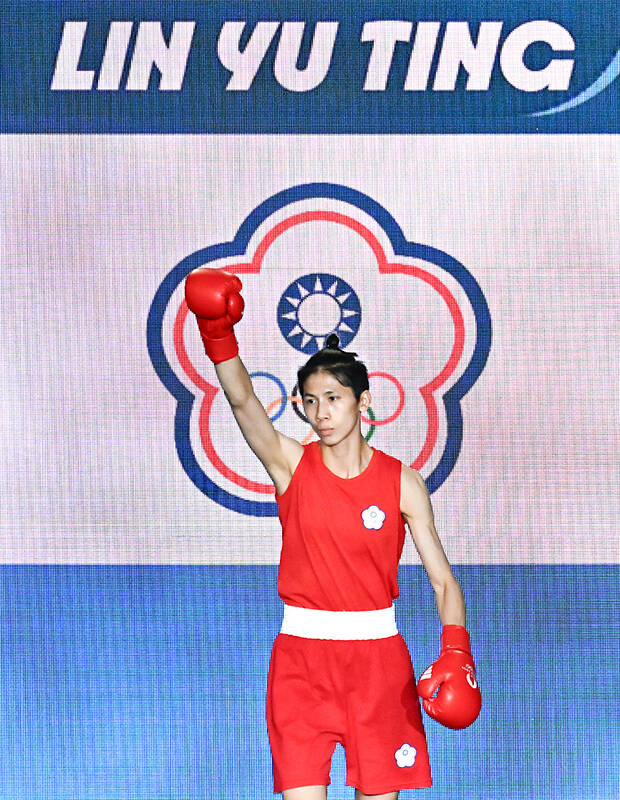Taiwanese boxer Lin Yu-ting (林郁婷) was eligible to compete in an international competition in the UK, the event’s organizer said yesterday, one day after Lin withdrew because it allegedly questioned her gender eligibility.
“World Boxing’s current eligibility policy does not prevent Lin Yu-ting from taking part in the World Boxing Cup,” the sporting federation said in a statement responding to comments from the Sports Administration.
“Selection decisions are made by national federations and the boxer was not entered in the event,” the statement said.

Photo: Chen Chih-chu, Taipei Times
While World Boxing regards the safety of athletes as “absolutely paramount,” it also recognizes that “gender clarity is an extremely complex issue with significant welfare concerns,” it said.
For that reason, World Boxing established a working group under its Medical Committee to “examine every aspect of this area” and ensure that its policy “prioritizes the health of boxers and delivers sporting integrity,” while also “endeavoring to make the sport as inclusive as possible,” it said.
World Boxing’s comments came one day after an eligibility dispute prompted Lin to pull out of the World Boxing Cup Finals in Sheffield, England, which are being held from Wednesday through tomorrow.
In a statement released on Wednesday, Sports Administration Director-General Cheng Shih-chung (鄭世忠) described Lin’s treatment as “regrettable,” since she was already cleared to compete in women’s boxing by the International Olympic Committee (IOC) at the Paris Olympic Games.
The World Boxing Cup Finals would have been Lin’s first competition since winning gold in the women’s 57kg category at this year’s Paris Olympic Games, where she was the subject of a gender eligibility row fueled by the International Boxing Association, the agency said.
World Boxing did not have “a clear policy and rules like the IOC to protect athletes, nor comprehensive information or procedures to ensure confidentiality for us to submit Lin’s medical records,” the Sports Administration said.
World Boxing also rejected a proposal for Lin to undergo a medical check in Sheffield, the agency said.
To avoid further “harm” to Lin, her coach and Taiwanese sports officials made the decision to “withdraw from the event proactively,” it said.
Taiwan joined World Boxing, which was founded in April last year, through the Chinese Taipei Boxing Association in mid-August.
The Taiwanese delegation to the event in Sheffield, attended by boxers from more than 20 countries, included Lin and Tokyo Games bronze medalist Huang Hsiao-wen (黃筱雯).
Lin, a two-time International Boxing Association (IBA) world champion in 2018 and 2022, was disqualified over her gender eligibility after winning a bronze at last year’s IBA Women’s World Boxing Championships in March of that year.
The IOC suspended the IBA as the sport’s recognized governing body in 2019, because of its lack of institutional reforms and transparency, instead choosing to organize the boxing events itself at the Summer Olympics in Tokyo and Paris.
The IOC said a new international boxing body was needed for the sport to be included in the 2028 Olympic Games in Los Angeles, and urged members to sever their links with the IBA because of its questionable governance.
However, 25 members of the Asian Boxing Confederation voted down a proposal to break from the IBA during an extraordinary congress held in Bangkok on Saturday last week, a blow to the 55-member World Boxing as well as its plan to obtain IOC recognition and keep the sport in the 2028 Summer Games.

Taiwan is stepping up plans to create self-sufficient supply chains for combat drones and increase foreign orders from the US to counter China’s numerical superiority, a defense official said on Saturday. Commenting on condition of anonymity, the official said the nation’s armed forces are in agreement with US Admiral Samuel Paparo’s assessment that Taiwan’s military must be prepared to turn the nation’s waters into a “hellscape” for the Chinese People’s Liberation Army (PLA). Paparo, the commander of the US Indo-Pacific Command, reiterated the concept during a Congressional hearing in Washington on Wednesday. He first coined the term in a security conference last

Prosecutors today declined to say who was questioned regarding alleged forgery on petitions to recall Democratic Progressive Party (DPP) legislators, after Chinese-language media earlier reported that members of the Chinese Nationalist Party (KMT) Youth League were brought in for questioning. The Ministry of Justice Investigation Bureau confirmed that two people had been questioned, but did not disclose any further information about the ongoing investigation. KMT Youth League members Lee Hsiao-liang (李孝亮) and Liu Szu-yin (劉思吟) — who are leading the effort to recall DPP caucus chief executive Rosalia Wu (吳思瑤) and Legislator Wu Pei-yi (吳沛憶) — both posted on Facebook saying: “I

Sung Chien-liang (宋建樑), who led efforts to recall Democratic Progressive Party (DPP) Legislator Lee Kun-cheng (李坤城), was released on bail of NT$80,000 today amid outcry over his decision to wear a Nazi armband to questioning the night before. Sung arrived at the New Taipei District Prosecutors’ Office for questioning in a recall petition forgery case last night wearing a red armband bearing a swastika, carrying a copy of Adolf Hitler’s Mein Kampf and giving a Nazi salute. Sung left the building at 1:15am without the armband and covering the book with his coat. Lee said today that this is a serious

The Ministry of Economic Affairs has fined Taobao NT$1.2 million (US$36,912) for advertisements that exceed its approved business scope, requiring the Chinese e-commerce platform to make corrections in the first half of this year or its license may be revoked. Lawmakers have called for stricter enforcement of Chinese e-commerce platforms and measures to prevent China from laundering its goods through Taiwan in response to US President Donald Trump’s heavy tariffs on China. The Legislative Yuan’s Finance Committee met today to discuss policies to prevent China from dumping goods in Taiwan, inviting government agencies to report. Democratic Progressive Party Legislator Kuo Kuo-wen (郭國文) said